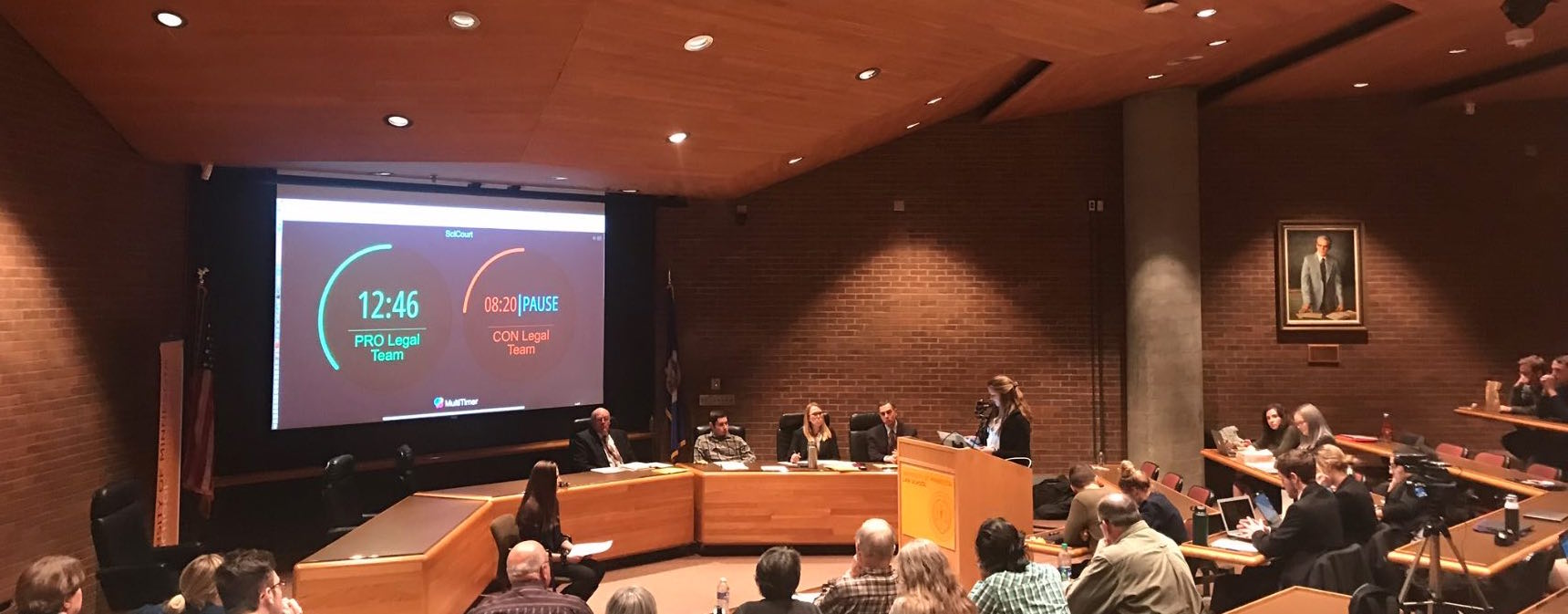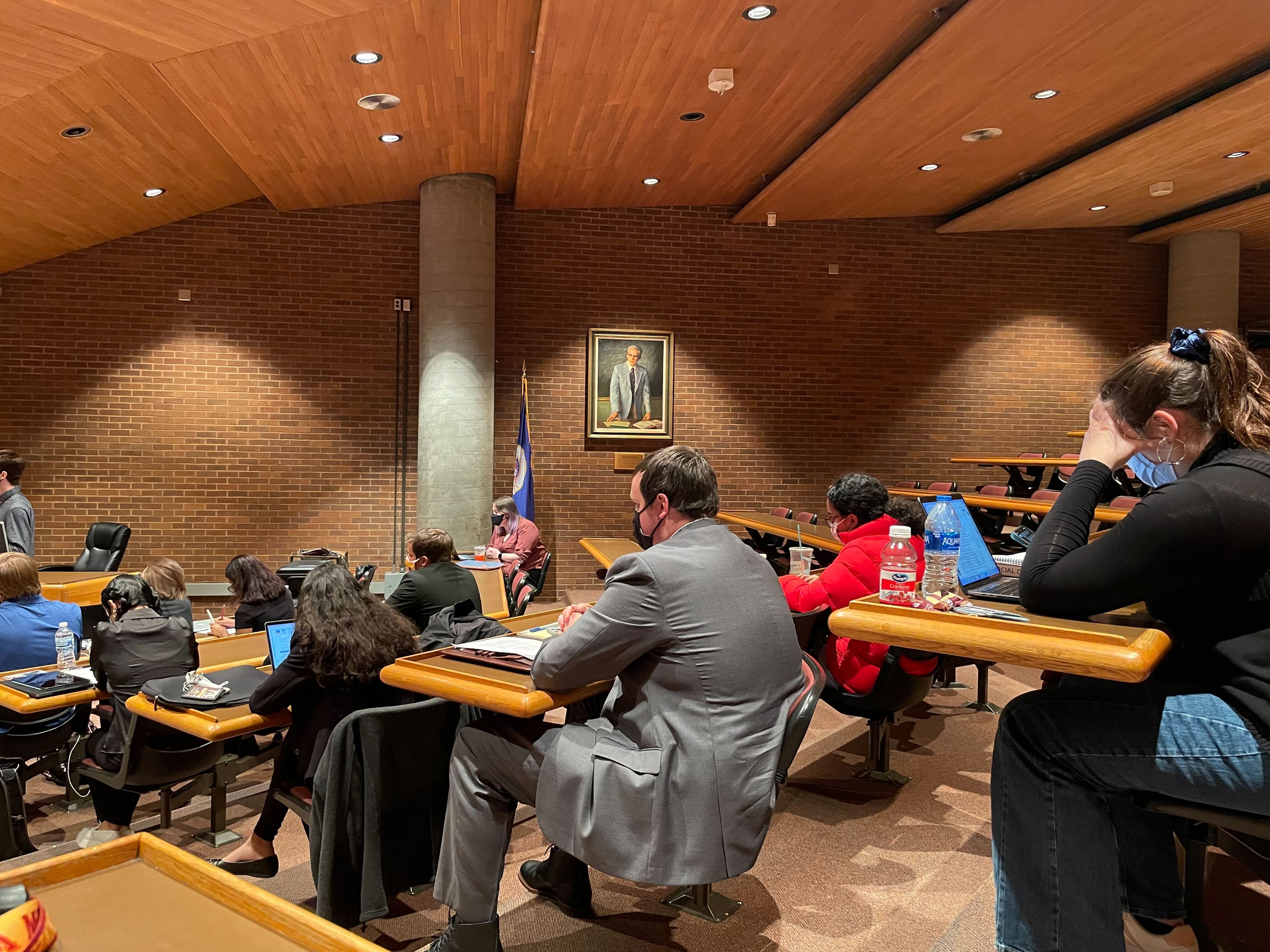
Welcome to Science Court!
Science Court is a project designed to combat polarization in American society and strengthen democracy. It is run as an interdisciplinary course in the University of Minnesota Honors Program involving students from across the university. The students select a controversial issue and spend an entire semester studying it in depth to determine the facts (based on sound scientific research) and then argue it in a mock trial in front of a jury of citizens with a mix of views and backgrounds. The public is engaged through compelling audio, video and online content generated by the students about the preparations, trial and verdict. The trial is free and open to the public.



The 2022 Science Court case is
Grading practices at the University of Minnesota can lead to bias, stress, and disincentivize learning, new innovative student assessment methods should be adopted
This year's Science Court is in partnership with the University of Minnesota (UMN) Student Senate. This topic is inspired by a Student Senate resolution, approved on December 3, 2020, requesting an extension of the UMN policy allowing students to opt for S/N grading (Satisfactory/Not satisfactory) in any course due to the COVID-19 pandemic. The Science Court case generalizes this to a full reevaluation of how students are assessed at UMN. This is timely considering increasing concerns regarding student mental health, the increased emphasis on student diversity and equity, changes in how students learn due to the technological environment, the increase in scholastic dishonesty facilitated by the internet and social media, and the rise of remote learning.
Science Court will consider student assessment holistically exploring what is known from scientific research in domains of knowledge informing this topic and propose two main strategies, Refine versus Reform, for the Student Senate to consider.
- The "Reform" (pro) approach proposes to replace the current UMN system with alternative methods for grading and student assessment proposed in the literature and tested at other institutions.
- The “Refine” (con) approach will argue to largely retain the current UMN grading system with modifications aimed at addressing its limitations based on research findings.
Stay tuned or follow us on twitter or join the Science Court mailing list to be kept informed.
What is your view on student assessment at the University of Minnesota?
LATEST BLOG POSTS
It All Came Down to This: Recap the Trial and Verdict
After fourteen weeks of preparation, Science Court finally held our trial on Saturday. Despite convincing arguments by both the refine and reform legal teams, supported by an abundance of information gathered by the science team, the jury ultimately decided in favor of the refine team, while also proposing their own combination of solutions. Here’s a summary of the trial that got them to this conclusion.

The Reform and Refine Legal Teams had Differing Opinions on an Ideal Grading System
Three Interesting Things we Found but You Won’t Hear at Trial
Members of our Science Team spent the entire semester finding information that will ultimately help either (or both) the refine and reform legal teams construct their arguments at trial tomorrow. However, such an extensive exploration from numerous sources inevitably led to almost all members of the Science Team finding information that while extremely interesting, did not fit into their presentations. Here are some of these interesting facts that you won’t hear at the trial tomorrow.
There is Conflicting Evidence About the Roles of Grades in Students’ Lives After School
Changing University Policy with our Work: Writing to the Student Senate
The University of Minnesota has a robust senate system involved in policy decisions that affect everyone at the University, and there are several individuals and committees that process requests.
Ultimately, all policies are decided by the Board of Regents, but many groups can bring issues to its attention, depending on the nature of the issue. For example, both the Faculty Consultative Committee and the Student Consultative Committee can bring attention to policies involving Student Academic Integrity. However, issues regarding Professional Development and Recognition can only be brought up by the Professionals and Administrators Consultative Committee.
Educational Policy is the category that can be brought up by the greatest number of committees because of the immense number of stakeholders. Therefore, Science Court has multiple ways students could present our research to potentially implement a policy change.
The class will likely present changes to the grading policy and supporting research to the Student Senate – as opposed to other senate sub organizations– because it was previously involved with grading policies.